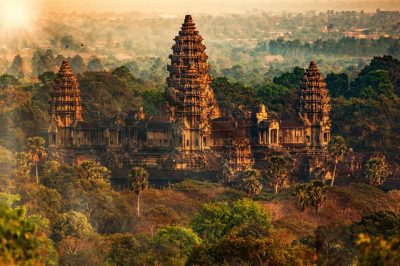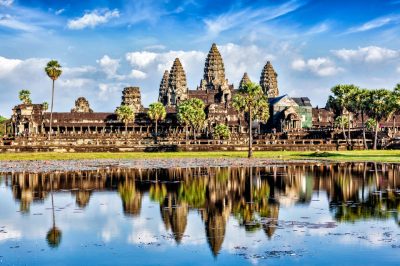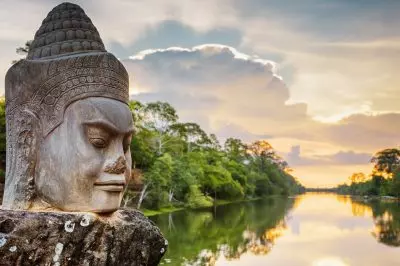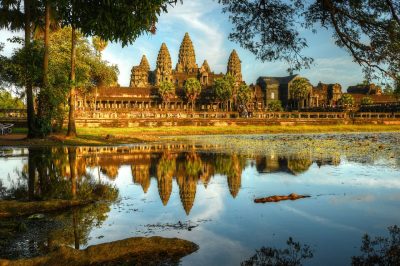 This year was quite dynamic for the gambling industry in Cambodia, as the sector is going through a period of change. Apart from all the work done by local lawmakers in terms of gambling regulation, 2018 also saw the first-ever Cambodia International Gaming Conference focused on the proposed gaming bill to take place.
This year was quite dynamic for the gambling industry in Cambodia, as the sector is going through a period of change. Apart from all the work done by local lawmakers in terms of gambling regulation, 2018 also saw the first-ever Cambodia International Gaming Conference focused on the proposed gaming bill to take place.
The country pushed ahead with new gambling legislation, making an attempt to attract overseas investors which would be willing to enter its casino and gambling sector and help it become one of the major gaming hubs in the region of South East Asia.
New Gambling Law Being Forged in Cambodia
 Casino gambling has risen in popularity in Cambodia after NagaCorp was given the first gaming license back in 1994. However, the enactment of the Law on Suppression of Gambling in 1996 made gambling in the country illegal for its citizens.
Casino gambling has risen in popularity in Cambodia after NagaCorp was given the first gaming license back in 1994. However, the enactment of the Law on Suppression of Gambling in 1996 made gambling in the country illegal for its citizens.
Because of the ban, licenses have been provided to operators under the so-called “exceptionality” principles, which on its turn created a situation of impossible balance and regulation.
As a result, small casino operations have been established in towns bordering Vietnam and Thailand, where gambling is also banned, so their residents traveled to Cambodian casinos to gamble. On the other hand, gamblers from China have been flocking to the coastal city of Sihanoukville. All this made the Government of Cambodia finally see the necessity for a new legal framework in order to adequately regulate the local gambling sector.
When enacted, the Law of Management of Integrated Resorts and Commercial Gambling (LMCG) is set to become the very basis of a stable and prolific industry.
The Cambodian Government has been considering the draft law, which has already passed through the MOEF and MOI and has then been reviewed by the Council of Jurists of the Council of Ministers.
Cambodia is currently divided into three zones in terms of gambling operations – favored, promoted and prohibited. The construction of integrated casino resorts will only be permitted in the so-called promoted zones, while the existing venues in favored zones will be forced to make the necessary changes in order to comply with the reforms that are to be made in the country’s gambling legislation in case they want to keep their operating licenses. The so-called prohibited zones will keep their current status quo in order to preserve the country’s cultural and religious traditions.
Apart from that, a gambling regulatory body is set to be created under the LMGC. The watchdog is to be named the Integrated Resorts management and Commercial Gambling Committee (GMC) and will comprise of seven members from seven ministries. The regulator will be taking care of the local gambling industry, including licensing procedures, other approvals, regulation and taxation.
Inaugural Cambodia International Gaming Conference Took Place in 2018
 Cambodia’s Ministry of Interior and Ministry of Economy and Finance (MOEF) hosted the first-ever Cambodia International Gaming Conference (CIGC) on September 7th, 2018.
Cambodia’s Ministry of Interior and Ministry of Economy and Finance (MOEF) hosted the first-ever Cambodia International Gaming Conference (CIGC) on September 7th, 2018.
The LMCG was the main topic of the conference, aimed at proving that the country has everything it needs to become one of the key tourism and leisure destinations in the region.
Despite all the efforts invested in the legislation, the LMCG will still need some time to be enacted. At the time when the conference was held, H.E. Mey Vann, Director General of the General Department of Financial Industry for the MOEF, revealed that he still had hopes of seeing the bill officially turned into law by 2019.
Reaching an agreement on some gambling issues was a challenging matter for the parliament members. Still, the gambling bill has already passed through various procedures, which has given hope to its supporters to see it ratified soon. The Government has shown that it wants to see this bill turned into law as soon as possible, in order to make sure that Cambodian gambling sector would be properly developed in order to become one of the major tourist attractions in the country.
Cambodia Aims at Attracting Foreign Investors
 As mentioned above, the country’s Government has been focused on pushing ahead with the new gambling legislation in order to create a more adequate and well-regulated legal framework for the local gambling sector. Cambodian lawmakers have been trying to turn the country into a flourishing tourist and leisure destination.
As mentioned above, the country’s Government has been focused on pushing ahead with the new gambling legislation in order to create a more adequate and well-regulated legal framework for the local gambling sector. Cambodian lawmakers have been trying to turn the country into a flourishing tourist and leisure destination.
In addition, the country has been trying to attract foreign investors to its casino and gaming industry, in an attempt to become one of the major gaming centers in South East Asia.
The proposed legislation, which has been in the making for several years now, is expected to see gambling operations generate tax revenues of almost $50 million. As revealed by Cambodian officials at the time of the legislation discussions, the country’s Government was considering to set a casino operations tax rate of between 4% to 5%, in an attempt to match the situation of casino gambling in Singapore.
For the time being, there are more than 60 licensed casinos in Cambodia, with the sector being dominated by Naga World Hotel and Entertainment complex situated in Phnom Penh.
Previously, some gambling market experts have explained that there was a lot of “unsatisfied demand” in the region, especially considering the overall number of available gaming tables, which has been very low and fuelled illegal competition. As mentioned above, the country has drawn benefit from gambling restrictions imposed on neighboring countries such as Thailand, where local residents are also prevented from gambling in existing casino venues.
For the time being, it is Naga World which holds the monopoly in Phnom Penh, but there are also major casino clusters in border towns and cities, such as Sihanoukville and Poipet.